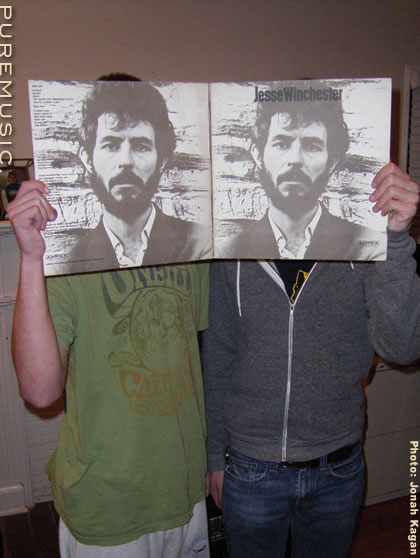
A Conversation with Jesse Winchester (continued)
PM: When I was checking out the debut record -- I believe that's right -- on iTunes, I was amazed to read it had been released or reissued no less than five times by five companies.
JW: Is that right?
PM: Yeah.
JW: Wow.
PM: They reeled them off -- Ampex -- I don't have them all in front of me. That's got to be some kind of a record.
JW: I have no idea.
PM: I was surprised to see that a song I like, "Step By Step," was used on The Wire.
JW: Yeah, yeah. I knew that. I started getting these emails from people about it, asking me, and the first I'd ever heard of it. They don't really tell you when these happen. All the paperwork and stuff is done elsewhere.
PM: Yeah, third-party.
JW: They never tell me about it.
PM: Yeah, so nobody calls you up and say, "Hey, is it okay if we're using in on The Wire?" Or, "Hey, they're using you on The Wire"?
JW: Nah, they don't need my permission.
PM: None of that.
JW: They make sure that they can do it without asking me.
PM: Right. So was that a show that you were aware of or had ever seen or--
JW: No.
PM: Oh, because that's a fantastic show.
JW: Yeah, I was reading a book -- in fact, I'm in the middle of it now -- by Richard Price -- I don't know if you know him. But he wrote for that show. He wrote a great book called Clockers.
PM: Exactly. I heard him on NPR at that time.
JW: Yeah. Well, he's a really good writer.
PM: What are you reading by him, Jesse?
JW: I'm reading a book called Lush Life. Yeah, it's good. Another New York crime kind of thing, street kids, that kind of thing.
PM: When I think of guys that write with a groove, but always have a mellowness to them, you know you're always near the top of that list. And so see a song pop up on as gritty a show as The Wire--
JW: Yeah, yeah. It's kind of weird.
PM: Songs are amazing like that.
JW: Yeah, they are.
PM: I heard you say on a radio show with Bob Edwards that you didn't own an acoustic until you were 30, which really surprised me. Are you mostly a nylon string guy now, or what do you like to play?
JW: I played nylon in performing, but I'm not really good at it. I just like the way it sounds. I started out wanting to be -- and still want to be -- Steve Cropper.
PM: [laughs] And still want to be. I like that.
JW: Yeah. I wanted to play guitar for Otis Redding and Sam & Dave, and those -- I wanted to be Steve Cropper. So I just played electric until somebody in Montreal stole my amplifier, and at that point I thought, well, I'm tired of carrying it around anyway. So at that point I bought an acoustic guitar, and that's what I do in performance. But I still love playing electric.
PM: What do you tend to play around the house these days?
JW: I've built a couple of Telecasters with -- there's this company in Washington State that sells parts for guitars, and you can put them together yourself.
PM: Who's that, Warmouth?
JW: Exactly, yeah. You know Warmouth?
PM: Oh, sure.
JW: So I've made a couple of Warmouths. And I love Telecasters. I keep telling people I think the Telecaster is the high-watermark of human civilization.
PM: Absolutely! I mean, people don't understand, for instance, what a great jazz guitar it is on the neck pickup.
JW: Just love it. Yeah, that's true, yeah. It's true. It's got a beautiful mellow sound when you want it, yeah.
PM: To me it's the most honest guitar.
JW: Yeah, that's right. Exactly. It's simple. There's nothing -- it's just a piece of plywood with--
PM: And it's got no bubbly in-between sounds.
JW: Yeah, it's nice. I love it.
print (pdf) listen to clips puremusic home

